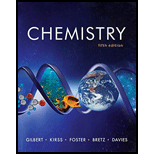
Chemistry: The Science in Context (Fifth Edition)
5th Edition
ISBN: 9780393614046
Author: Thomas R. Gilbert, Rein V. Kirss, Natalie Foster, Stacey Lowery Bretz, Geoffrey Davies
Publisher: W. W. Norton & Company
expand_more
expand_more
format_list_bulleted
Concept explainers
Question
Chapter 12, Problem 12.83QP
Interpretation Introduction
Interpretation: The structure of the alcohol and the fatty acids that results from glyceride saponification is to be drawn.
Concept introduction: The process that is used for making of soap is known as saponification. When glyceride reacts with an aqueous base (usually NaOH) then ester bonds are broken to yield glycerol and the sodium salt of a
To determine: The structure of the alcohol and the fatty acids that results from glyceride saponification.
Expert Solution & Answer
Want to see the full answer?
Check out a sample textbook solution
Students have asked these similar questions
Show work with explanation needed. don't give Ai generated solution
Show work. don't give Ai generated solution
None
Chapter 12 Solutions
Chemistry: The Science in Context (Fifth Edition)
Ch. 12.2 - Prob. 1PECh. 12.3 - Prob. 2PECh. 12.4 - Prob. 3PECh. 12.6 - Prob. 4PECh. 12.6 - Prob. 5PECh. 12.6 - Prob. 6PECh. 12.6 - Prob. 7PECh. 12.6 - Prob. 8PECh. 12 - Prob. 12.1VPCh. 12 - Prob. 12.2VP
Ch. 12 - Prob. 12.3VPCh. 12 - Prob. 12.4VPCh. 12 - Prob. 12.5VPCh. 12 - Prob. 12.6VPCh. 12 - Prob. 12.7VPCh. 12 - Prob. 12.8VPCh. 12 - Prob. 12.9VPCh. 12 - Prob. 12.10VPCh. 12 - Prob. 12.11VPCh. 12 - Prob. 12.12VPCh. 12 - Prob. 12.13VPCh. 12 - Prob. 12.14VPCh. 12 - Prob. 12.15VPCh. 12 - Prob. 12.16VPCh. 12 - Prob. 12.17QPCh. 12 - Prob. 12.18QPCh. 12 - Prob. 12.19QPCh. 12 - Prob. 12.20QPCh. 12 - Prob. 12.21QPCh. 12 - Prob. 12.22QPCh. 12 - Prob. 12.23QPCh. 12 - Prob. 12.24QPCh. 12 - Prob. 12.25QPCh. 12 - Prob. 12.26QPCh. 12 - Prob. 12.27QPCh. 12 - Prob. 12.28QPCh. 12 - Prob. 12.29QPCh. 12 - Prob. 12.30QPCh. 12 - Prob. 12.31QPCh. 12 - Prob. 12.32QPCh. 12 - Prob. 12.33QPCh. 12 - Prob. 12.34QPCh. 12 - Prob. 12.35QPCh. 12 - Prob. 12.36QPCh. 12 - Prob. 12.37QPCh. 12 - Prob. 12.38QPCh. 12 - Prob. 12.39QPCh. 12 - Prob. 12.40QPCh. 12 - Prob. 12.41QPCh. 12 - Prob. 12.42QPCh. 12 - Prob. 12.43QPCh. 12 - Prob. 12.44QPCh. 12 - Prob. 12.45QPCh. 12 - Prob. 12.46QPCh. 12 - Prob. 12.47QPCh. 12 - Prob. 12.48QPCh. 12 - Prob. 12.49QPCh. 12 - Prob. 12.50QPCh. 12 - Prob. 12.51QPCh. 12 - Prob. 12.52QPCh. 12 - Prob. 12.53QPCh. 12 - Prob. 12.54QPCh. 12 - Prob. 12.55QPCh. 12 - Prob. 12.56QPCh. 12 - Prob. 12.57QPCh. 12 - Prob. 12.58QPCh. 12 - Prob. 12.59QPCh. 12 - Prob. 12.60QPCh. 12 - Prob. 12.61QPCh. 12 - Prob. 12.62QPCh. 12 - Prob. 12.63QPCh. 12 - Prob. 12.64QPCh. 12 - Prob. 12.65QPCh. 12 - Prob. 12.66QPCh. 12 - Prob. 12.67QPCh. 12 - Prob. 12.68QPCh. 12 - Prob. 12.69QPCh. 12 - Prob. 12.70QPCh. 12 - Prob. 12.71QPCh. 12 - Prob. 12.72QPCh. 12 - Prob. 12.73QPCh. 12 - Prob. 12.74QPCh. 12 - Prob. 12.75QPCh. 12 - Prob. 12.76QPCh. 12 - Prob. 12.77QPCh. 12 - Prob. 12.78QPCh. 12 - Prob. 12.79QPCh. 12 - Prob. 12.80QPCh. 12 - Prob. 12.81QPCh. 12 - Prob. 12.82QPCh. 12 - Prob. 12.83QPCh. 12 - Prob. 12.84QPCh. 12 - Prob. 12.85QPCh. 12 - Prob. 12.86QPCh. 12 - Prob. 12.87QPCh. 12 - Prob. 12.88QPCh. 12 - Prob. 12.89APCh. 12 - Prob. 12.90APCh. 12 - Prob. 12.91APCh. 12 - Prob. 12.92APCh. 12 - Prob. 12.93APCh. 12 - Prob. 12.94APCh. 12 - Prob. 12.95APCh. 12 - Prob. 12.96APCh. 12 - Prob. 12.97APCh. 12 - Prob. 12.98APCh. 12 - Prob. 12.99APCh. 12 - Prob. 12.100APCh. 12 - Prob. 12.101APCh. 12 - Prob. 12.102APCh. 12 - Prob. 12.103APCh. 12 - Prob. 12.104APCh. 12 - Prob. 12.105APCh. 12 - Prob. 12.106APCh. 12 - Prob. 12.107APCh. 12 - Prob. 12.108APCh. 12 - Prob. 12.109APCh. 12 - Prob. 12.110AP
Knowledge Booster
Learn more about
Need a deep-dive on the concept behind this application? Look no further. Learn more about this topic, chemistry and related others by exploring similar questions and additional content below.Similar questions
arrow_back_ios
SEE MORE QUESTIONS
arrow_forward_ios
Recommended textbooks for you
 ChemistryChemistryISBN:9781305957404Author:Steven S. Zumdahl, Susan A. Zumdahl, Donald J. DeCostePublisher:Cengage Learning
ChemistryChemistryISBN:9781305957404Author:Steven S. Zumdahl, Susan A. Zumdahl, Donald J. DeCostePublisher:Cengage Learning ChemistryChemistryISBN:9781259911156Author:Raymond Chang Dr., Jason Overby ProfessorPublisher:McGraw-Hill Education
ChemistryChemistryISBN:9781259911156Author:Raymond Chang Dr., Jason Overby ProfessorPublisher:McGraw-Hill Education Principles of Instrumental AnalysisChemistryISBN:9781305577213Author:Douglas A. Skoog, F. James Holler, Stanley R. CrouchPublisher:Cengage Learning
Principles of Instrumental AnalysisChemistryISBN:9781305577213Author:Douglas A. Skoog, F. James Holler, Stanley R. CrouchPublisher:Cengage Learning Organic ChemistryChemistryISBN:9780078021558Author:Janice Gorzynski Smith Dr.Publisher:McGraw-Hill Education
Organic ChemistryChemistryISBN:9780078021558Author:Janice Gorzynski Smith Dr.Publisher:McGraw-Hill Education Chemistry: Principles and ReactionsChemistryISBN:9781305079373Author:William L. Masterton, Cecile N. HurleyPublisher:Cengage Learning
Chemistry: Principles and ReactionsChemistryISBN:9781305079373Author:William L. Masterton, Cecile N. HurleyPublisher:Cengage Learning Elementary Principles of Chemical Processes, Bind...ChemistryISBN:9781118431221Author:Richard M. Felder, Ronald W. Rousseau, Lisa G. BullardPublisher:WILEY
Elementary Principles of Chemical Processes, Bind...ChemistryISBN:9781118431221Author:Richard M. Felder, Ronald W. Rousseau, Lisa G. BullardPublisher:WILEY

Chemistry
Chemistry
ISBN:9781305957404
Author:Steven S. Zumdahl, Susan A. Zumdahl, Donald J. DeCoste
Publisher:Cengage Learning

Chemistry
Chemistry
ISBN:9781259911156
Author:Raymond Chang Dr., Jason Overby Professor
Publisher:McGraw-Hill Education

Principles of Instrumental Analysis
Chemistry
ISBN:9781305577213
Author:Douglas A. Skoog, F. James Holler, Stanley R. Crouch
Publisher:Cengage Learning

Organic Chemistry
Chemistry
ISBN:9780078021558
Author:Janice Gorzynski Smith Dr.
Publisher:McGraw-Hill Education

Chemistry: Principles and Reactions
Chemistry
ISBN:9781305079373
Author:William L. Masterton, Cecile N. Hurley
Publisher:Cengage Learning

Elementary Principles of Chemical Processes, Bind...
Chemistry
ISBN:9781118431221
Author:Richard M. Felder, Ronald W. Rousseau, Lisa G. Bullard
Publisher:WILEY
Calorimetry Concept, Examples and Thermochemistry | How to Pass Chemistry; Author: Melissa Maribel;https://www.youtube.com/watch?v=nSh29lUGj00;License: Standard YouTube License, CC-BY